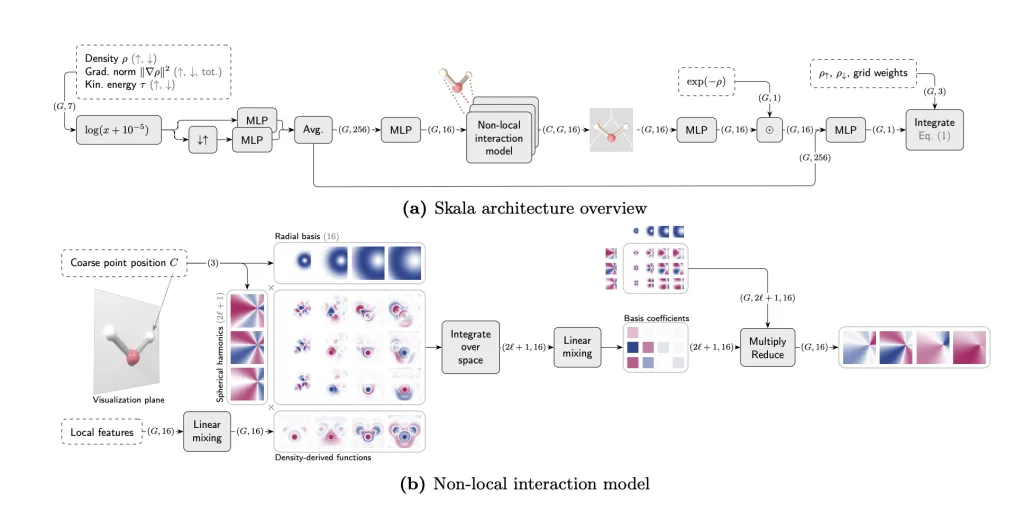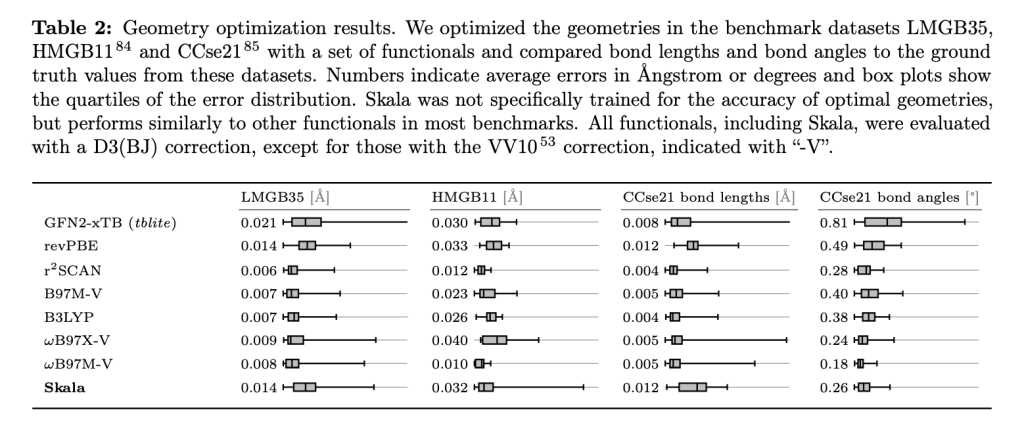TL;DR: Skala is a deep-learning exchange–correlation functional for Kohn–Sham Density Functional Theory (DFT) that targets hybrid-level accuracy at semi-local cost, reporting MAE ≈ 1.06 kcal/mol on W4-17 (0.85 on the single-reference subset) and WTMAD-2 ≈ 3.89 kcal/mol on GMTKN55; evaluations use a fixed D3(BJ) dispersion correction. It is positioned for main-group molecular chemistry today, with transition metals and periodic systems slated as future extensions. Azure AI Foundry The model and tooling are available now via Azure AI Foundry Labs and the open-source microsoft/skala repository.
How much compression ratio and throughput would you recover by training a format-aware graph compressor and shipping only a self-describing graph to a universal decoder? Microsoft Research has released Skala, a neural exchange–correlation (XC) functional for Kohn–Sham Density Functional Theory (DFT). Skala learns non-local effects from data while keeping the computational profile comparable to meta-GGA functionals.
What Skala is (and isn’t)?
Skala replaces a hand-crafted XC form with a neural functional evaluated on standard meta-GGA grid features. It explicitly does not attempt to learn dispersion in this first release; benchmark evaluations use a fixed D3 correction (D3(BJ) unless noted). The goal is rigorous main-group thermochemistry at semi-local cost, not a universal functional for all regimes on day one.

Benchmarks
On W4-17 atomization energies, Skala reports MAE 1.06 kcal/mol on the full set and 0.85 kcal/mol on the single-reference subset. On GMTKN55, Skala achieves WTMAD-2 3.89 kcal/mol, competitive with top hybrids; all functionals were evaluated with the same dispersion settings (D3(BJ) unless VV10/D3(0) applies).


Architecture and training
Skala evaluates meta-GGA features on the standard numerical integration grid, then aggregates information via a finite-range, non-local neural operator (bounded enhancement factor; exact-constraint aware including Lieb–Oxford, size-consistency, and coordinate-scaling). Training proceeds in two phases: (1) pre-training on B3LYP densities with XC labels extracted from high-level wavefunction energies; (2) SCF-in-the-loop fine-tuning using Skala’s own densities (no backprop through SCF).
The model is trained on a large, curated corpus dominated by ~80k high-accuracy total atomization energies (MSR-ACC/TAE) plus additional reactions/properties, with W4-17 and GMTKN55 removed from training to avoid leakage.
Cost profile and implementation
Skala keeps semi-local cost scaling and is engineered for GPU execution via GauXC; the public repo exposes: (i) a PyTorch implementation and microsoft-skala PyPI package with PySCF/ASE hooks, and (ii) a GauXC add-on usable to integrate Skala into other DFT stacks. The README lists ~276k parameters and provides minimal examples.
Application
In practice, Skala slots into main-group molecular workflows where semi-local cost and hybrid-level accuracy matter: high-throughput reaction energetics (ΔE, barrier estimates), conformer/radical stability ranking, and geometry/dipole predictions feeding QSAR/lead-optimization loops. Because it’s exposed via PySCF/ASE and a GauXC GPU path, teams can run batched SCF jobs and screen candidates at near meta-GGA runtime, then reserve hybrids/CC for final checks. For managed experiments and sharing, Skala is available in Azure AI Foundry Labs and as an open GitHub/PyPI stack.
Key Takeaways
- Performance: Skala achieves MAE 1.06 kcal/mol on W4-17 (0.85 on the single-reference subset) and WTMAD-2 3.89 kcal/mol on GMTKN55; dispersion is applied via D3(BJ) in reported evaluations.
- Method: A neural XC functional with meta-GGA inputs and finite-range learned non-locality, honoring key exact constraints; retains semi-local O(N³) cost and does not learn dispersion in this release.
- Training signal: Trained on ~150k high-accuracy labels, including ~80k CCSD(T)/CBS-quality atomization energies (MSR-ACC/TAE); SCF-in-the-loop fine-tuning uses Skala’s own densities; public test sets are de-duplicated from training.
Skala is a pragmatic step: a neural XC functional reporting MAE 1.06 kcal/mol on W4-17 (0.85 on single-reference) and WTMAD-2 3.89 kcal/mol on GMTKN55, evaluated with D3(BJ) dispersion, and scoped today to main-group molecular systems. It’s accessible for testing via Azure AI Foundry Labs with code and PySCF/ASE integrations on GitHub, enabling direct head-to-head baselines against existing meta-GGAs and hybrids.
Check out the Technical Paper, GitHub Page and technical blog. Feel free to check out our GitHub Page for Tutorials, Codes and Notebooks. Also, feel free to follow us on Twitter and don’t forget to join our 100k+ ML SubReddit and Subscribe to our Newsletter. Wait! are you on telegram? now you can join us on telegram as well.
Asif Razzaq is the CEO of Marktechpost Media Inc.. As a visionary entrepreneur and engineer, Asif is committed to harnessing the potential of Artificial Intelligence for social good. His most recent endeavor is the launch of an Artificial Intelligence Media Platform, Marktechpost, which stands out for its in-depth coverage of machine learning and deep learning news that is both technically sound and easily understandable by a wide audience. The platform boasts of over 2 million monthly views, illustrating its popularity among audiences.
















